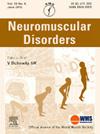38PClinical course and treatment of anti-mitochondrial M2 antibody-positive myositis: a single-center retrospective case series
IF 2.8
4区 医学
Q2 CLINICAL NEUROLOGY
引用次数: 0
Abstract
We reported that anti-mitochondrial M2 antibody (AM2A)-positive myositis may be an independent subtype of autoimmune myositis based on clinicopathological and statistical analysis. It is still unknown how effective conventional immunotherapy is among patients with AM2A-positive myositis. We chose 13 AM2A-positive patients who underwent muscle biopsy from January 2017 to March 2025. We retrospectively examined their clinical history including reactivity to immunotherapy. There were 6 men and 7 women. The mean age at muscle biopsy was 58 ± 4.1 years. The average of pre-biopsy disease duration was 27.5 ± 24.3 months. Twelve patients showed high creatine kinase (CK), and 3 had severe muscle weakness with an MMT score lower than 4 in the extremities and/or the neck muscles. Although all patients are ambulatory, 4 patients had respiratory failure and 2 of them needed mechanical ventilation support. All patients showed arrhythmia and/or cardiac dysfunction on echocardiogram. Except for 2 patients who have not been treated, 11 patients had prednisolone as the first line. Six had additional medication, including immunosuppressants and/or intravenous immunoglobulin. Five patients exhibited a favorable clinical course, whereas symptoms relapsed as the medication dosage was reduced in 4 patients. In addition, the arrhythmia persisted in 2 of them despite improvement of muscle strength. Immunotherapy including prednisolone and intravenous immunoglobulin was ineffective in one patient with ventilation support and he died with comorbidity. Another patient was weaned from the ventilator and walked by himself. However, he suddenly died of unknown causes after discharge from hospital. Although most of the patients showed good response to immunotherapy in the early state, some experienced difficulties with treatment. Cardiac problems could remain in the long term. We need to carefully follow up on the condition including cardiac function with AM2A-positive myositis.
抗线粒体M2抗体阳性肌炎的临床病程和治疗:单中心回顾性病例系列
我们报道了基于临床病理和统计分析的抗线粒体M2抗体(AM2A)阳性肌炎可能是自身免疫性肌炎的一个独立亚型。传统免疫疗法对am2a阳性肌炎患者的疗效尚不清楚。我们选择了2017年1月至2025年3月期间接受肌肉活检的13例am2a阳性患者。我们回顾性检查了他们的临床病史,包括对免疫治疗的反应性。有6男7女。肌肉活检的平均年龄为58±4.1岁。活检前病程平均为27.5±24.3个月。12例患者表现为高肌酸激酶(CK), 3例有严重的肌肉无力,四肢和/或颈部肌肉MMT评分低于4分。4例患者出现呼吸衰竭,其中2例需要机械通气支持。所有患者超声心动图均显示心律失常和/或心功能障碍。除2例患者未接受治疗外,11例患者以泼尼松龙作为一线治疗。6名患者接受了额外的药物治疗,包括免疫抑制剂和/或静脉注射免疫球蛋白。5例患者表现出良好的临床病程,4例患者随着用药剂量的减少症状复发。此外,尽管肌肉力量有所改善,但其中2例心律失常仍持续存在。包括强的松龙和静脉注射免疫球蛋白在内的免疫治疗对一名患者的通气支持无效,他死于合并症。另一名患者已脱离呼吸机并自行行走。然而,他出院后突然死亡,原因不明。虽然大多数患者在早期对免疫治疗反应良好,但一些患者在治疗中遇到困难。心脏问题可能会长期存在。我们需要仔细追踪病情包括am2a阳性肌炎患者的心功能。
本文章由计算机程序翻译,如有差异,请以英文原文为准。
求助全文
约1分钟内获得全文
求助全文
来源期刊

Neuromuscular Disorders
医学-临床神经学
CiteScore
4.60
自引率
3.60%
发文量
543
审稿时长
53 days
期刊介绍:
This international, multidisciplinary journal covers all aspects of neuromuscular disorders in childhood and adult life (including the muscular dystrophies, spinal muscular atrophies, hereditary neuropathies, congenital myopathies, myasthenias, myotonic syndromes, metabolic myopathies and inflammatory myopathies).
The Editors welcome original articles from all areas of the field:
• Clinical aspects, such as new clinical entities, case studies of interest, treatment, management and rehabilitation (including biomechanics, orthotic design and surgery).
• Basic scientific studies of relevance to the clinical syndromes, including advances in the fields of molecular biology and genetics.
• Studies of animal models relevant to the human diseases.
The journal is aimed at a wide range of clinicians, pathologists, associated paramedical professionals and clinical and basic scientists with an interest in the study of neuromuscular disorders.
 求助内容:
求助内容: 应助结果提醒方式:
应助结果提醒方式:


